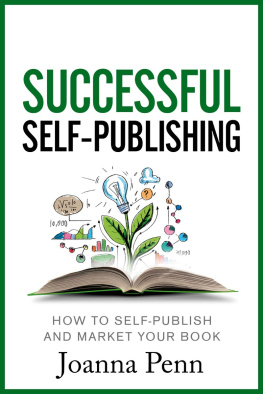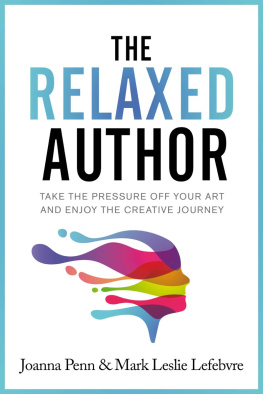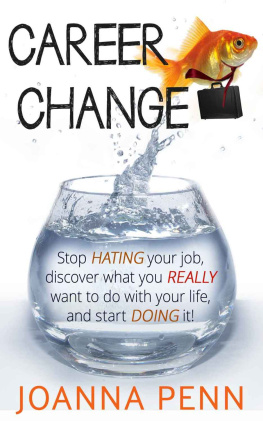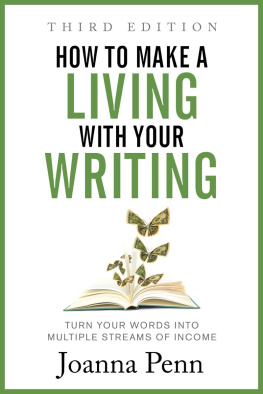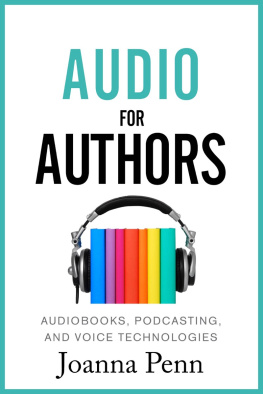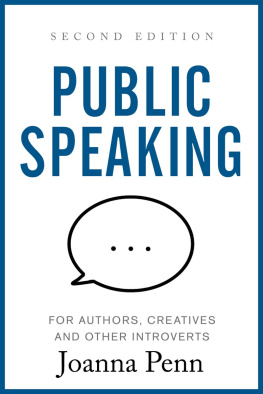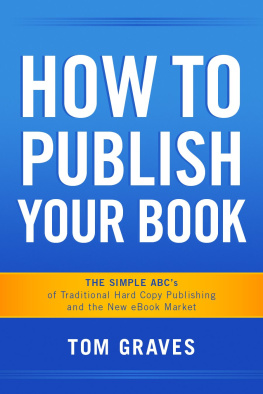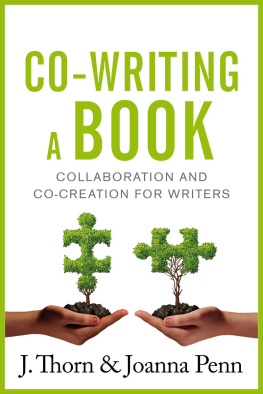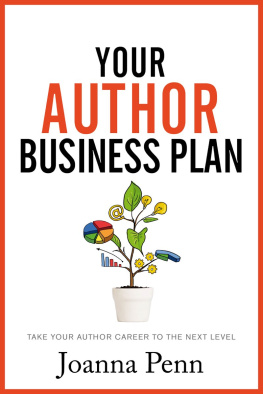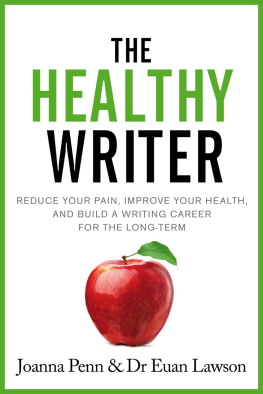Joanna Penn - Successful Self-Publishing: How to Self-Publish and Market Your Book in Ebook and Print
Here you can read online Joanna Penn - Successful Self-Publishing: How to Self-Publish and Market Your Book in Ebook and Print full text of the book (entire story) in english for free. Download pdf and epub, get meaning, cover and reviews about this ebook. year: 2018, publisher: Curl Up Press, genre: Romance novel. Description of the work, (preface) as well as reviews are available. Best literature library LitArk.com created for fans of good reading and offers a wide selection of genres:
Romance novel
Science fiction
Adventure
Detective
Science
History
Home and family
Prose
Art
Politics
Computer
Non-fiction
Religion
Business
Children
Humor
Choose a favorite category and find really read worthwhile books. Enjoy immersion in the world of imagination, feel the emotions of the characters or learn something new for yourself, make an fascinating discovery.
- Book:Successful Self-Publishing: How to Self-Publish and Market Your Book in Ebook and Print
- Author:
- Publisher:Curl Up Press
- Genre:
- Year:2018
- Rating:4 / 5
- Favourites:Add to favourites
- Your mark:
- 80
- 1
- 2
- 3
- 4
- 5
Successful Self-Publishing: How to Self-Publish and Market Your Book in Ebook and Print: summary, description and annotation
We offer to read an annotation, description, summary or preface (depends on what the author of the book "Successful Self-Publishing: How to Self-Publish and Market Your Book in Ebook and Print" wrote himself). If you haven't found the necessary information about the book — write in the comments, we will try to find it.
Joanna Penn: author's other books
Who wrote Successful Self-Publishing: How to Self-Publish and Market Your Book in Ebook and Print? Find out the surname, the name of the author of the book and a list of all author's works by series.
Successful Self-Publishing: How to Self-Publish and Market Your Book in Ebook and Print — read online for free the complete book (whole text) full work
Below is the text of the book, divided by pages. System saving the place of the last page read, allows you to conveniently read the book "Successful Self-Publishing: How to Self-Publish and Market Your Book in Ebook and Print" online for free, without having to search again every time where you left off. Put a bookmark, and you can go to the page where you finished reading at any time.
Font size:
Interval:
Bookmark:
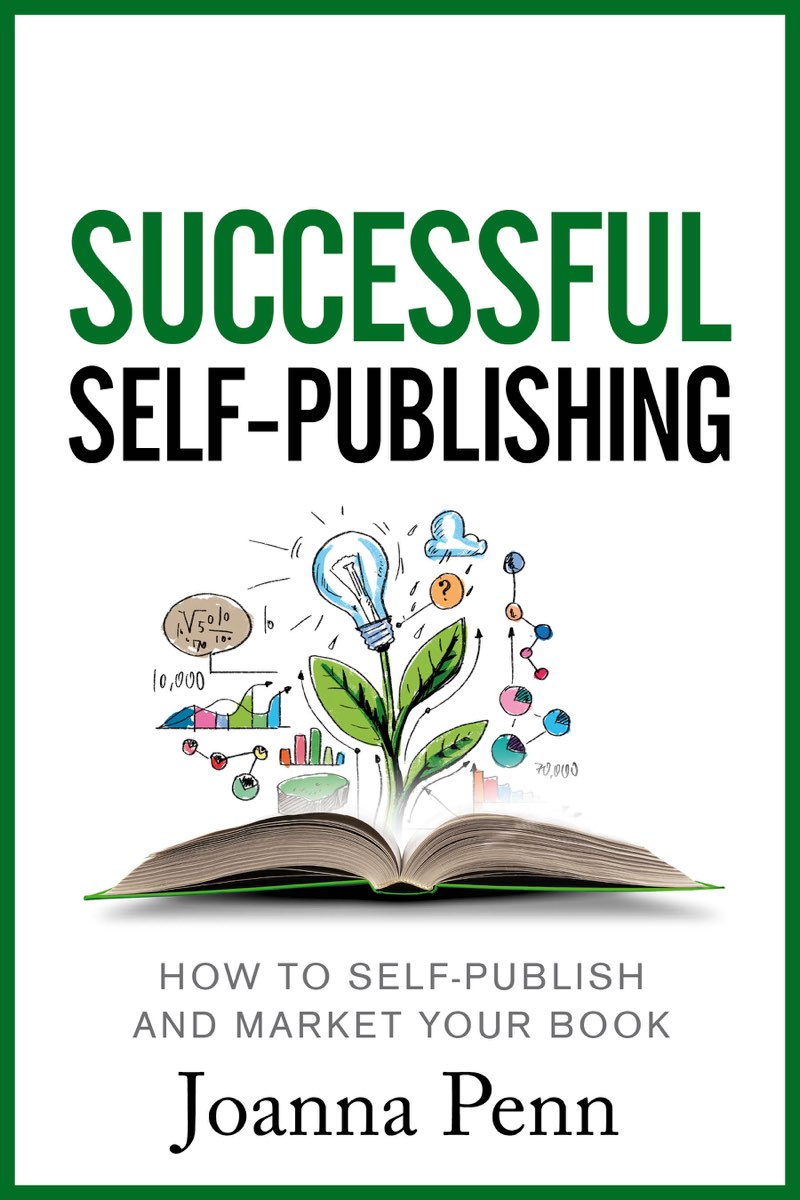
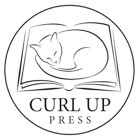
I.
II.
T his little book will give you an overview of the process to successfully self-publish.
It provides the exact way that I have used to self-publish 27 books of fiction and non-fiction, and which provides the basis of my own multi-six-figure income as an author-entrepreneur.
But, of course, it wasn't always like this!
I self-published my first book in 2008 before ebooks went mainstream and people started to read on their phones, before the Kindle and print-on-demand and the rise of digital audiobooks. I made a lot of mistakes, but over time, I've learned the most effective way to self-publish in order to satisfy my own creativity and make a good income. I'll share it all with you so you can save time, money and heartache on your own author journey.
The book includes everything you need to self-publish in ebook, print, and audiobook formats, as well as details on how much it might cost and how you will get paid, plus tips on how to market fiction and non-fiction books.
Like any new process, it might seem complicated at first, but then it gets easier. Once you know how to publish in each of these formats, you will realize that publishing is not the hard part. Publishing a book takes just a couple of hours, but writing, editing, and marketing remain the most challenging aspects of the process!
This book represents my own self-publishing experience and opinions but, of course, I'm an indie (independent) author and we all vary in the way we approach publishing. That's the beauty of being independent there are no rules! I've tried to ensure the information is accurate, but technology, functionality, and terms and conditions change over time, so please check the platform details when you publish.
Note: There are affiliate links within this book to products and services that I recommend and use personally. This means that I receive a small percentage of sales with no extra cost to you and in some cases, you may receive a discount for using my links. I only recommend products and services that I believe are great for authors!
Before we jump into how to self-publish, it's important to define some terms at the outset.
S elf-publishing used to be a dirty word, with implications of vanity publishing by authors so desperate that they would pay to have their book released into the world.
But these days, self-publishing is a valid choice and publishers regularly seek out successful authors who do well through the indie route. Some traditionally published authors also choose to self-publish some of their books in order to make the most of their options.
I consciously chose to self-publish back in 2008. I wanted to spend my time writing, creating books and running my own business, reaching readers directly in a growing global market and making a decent living. This is now what I do every day and it continues to fire my passion for the indie life.
Self-publishing is still the term used by most people, but I prefer being described as an independent or indie author, or even as an author-entrepreneur.
Here are the differences between the terms in my opinion, and to be clear, there is no value judgment implied in the split definition. It's more about what you want to achieve as an author, and, of course, this may change over time.
- Does everything themselves e.g. cover design and editing.
- Defines success as a finished book that is out there in the world and doesnt necessarily aim to sell a lot of books to readers.
This term is appropriate for creative projects with a lot of heart and potentially little commercial value e.g. I helped my 9-year-old niece self-publish her first book, as well as helping my 65-year-old father self-publish his thriller, Nada.
[ Here's a video that Amazon made about us for Father's Day:
www.TheCreativePenn.com/fathersday ]
Neither of these projects were commercial, as both saw the completion of the book as the end goal, not the sales associated with it.
- Budgets for and works with creative professionals to make their book into a fantastic finished product. This may include working with editors and cover designers, as well as formatters and other freelancers.
- Understands that a book is an intellectual property asset that can earn money for the life of the author and 50-70 years after they die.
- Defines success as long-term income as well as creative fulfilment.
- Takes control of their writing career, from first book to (potentially) CEO of a global creative empire.
Here are the main reasons that authors choose to go indie.
You don't need to ask anyone's permission to write or publish. You can write whatever you want and publish whenever you want. You have control over your book title, your cover, and your pricing. You also have control over the territories that you publish in, for example, I have now sold books in 86 countries.
You can publish a book and have it available for sale in less than 24 hours (for ebooks), then receive payment just a few months later. Print books can be available for sale in a few days and audiobooks in a few weeks.
For authors used to the year-long traditional publishing cycle, this speed is incredibly rewarding.
If you self-publish, you receive 35-70% royalty on the sale of ebooks, which is better than pretty much every traditional publishing deal out there. If you sell direct from your own site, then you can get up to 90%. You can set your own profit margin on print books and you can get 25-40+% audiobook royalties.
Every book you write adds to your financial bottom line and you don't have to sell your time working to build someone else's business or brand. You can publish in every global market and license subsidiary rights, so your income is scalable on every book.
It's difficult for traditionally published authors to determine what kind of marketing works because they don't get real-time sales figures, whereas indies can check reports that are updated every few hours. This helps determine which marketing avenues to focus on for ongoing sales.
We can also track our income every day and reconcile it with our payments each month, whereas royalty statements from traditional publishers are notoriously hard to understand and reconcile.
Being an indie author means taking on the jobs that traditional agents and publishers do for their authors until you can build your own team of creative professionals.
Some authors don't actually want freedom, they would prefer that someone else did the publishing and marketing side and are happy to give up the lions share of their royalty for that privilege.
Plus, just because your book is available everywhere, it doesnt mean that it will sell.
Font size:
Interval:
Bookmark:
Similar books «Successful Self-Publishing: How to Self-Publish and Market Your Book in Ebook and Print»
Look at similar books to Successful Self-Publishing: How to Self-Publish and Market Your Book in Ebook and Print. We have selected literature similar in name and meaning in the hope of providing readers with more options to find new, interesting, not yet read works.
Discussion, reviews of the book Successful Self-Publishing: How to Self-Publish and Market Your Book in Ebook and Print and just readers' own opinions. Leave your comments, write what you think about the work, its meaning or the main characters. Specify what exactly you liked and what you didn't like, and why you think so.

